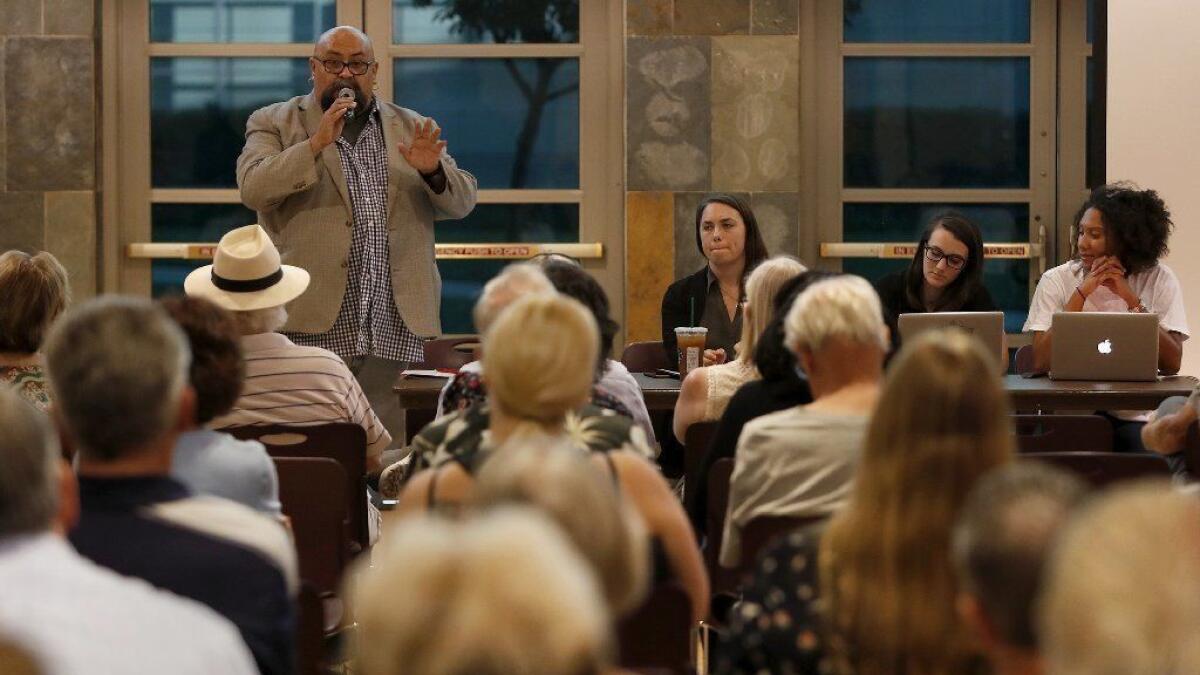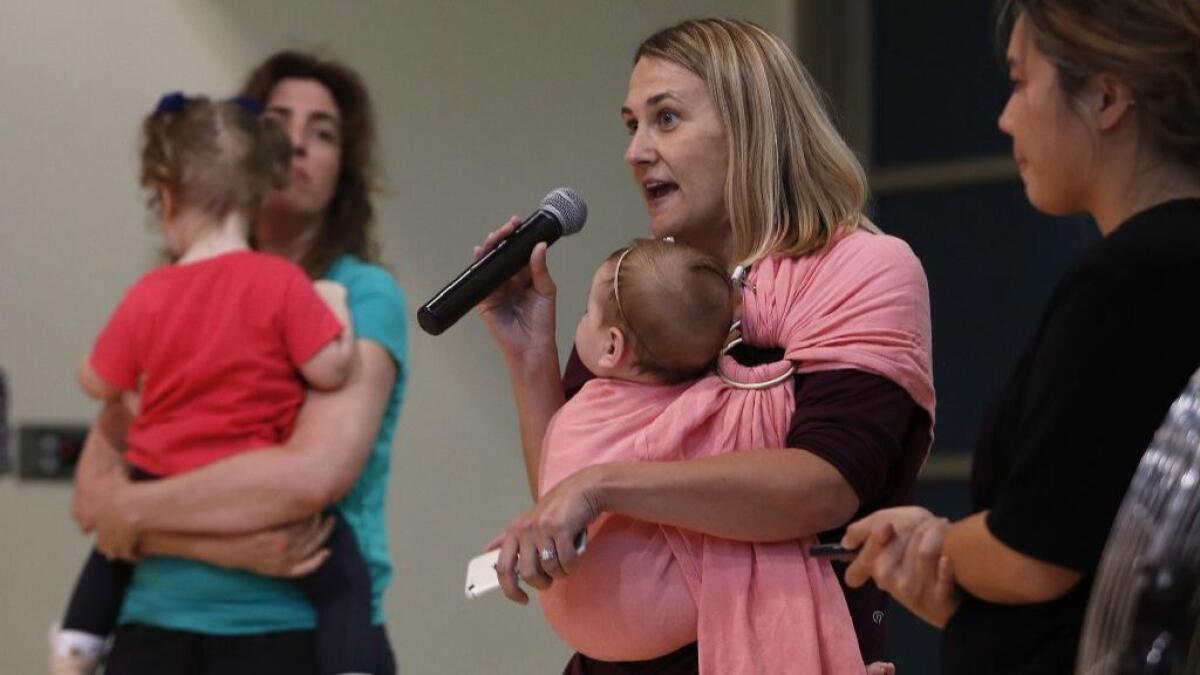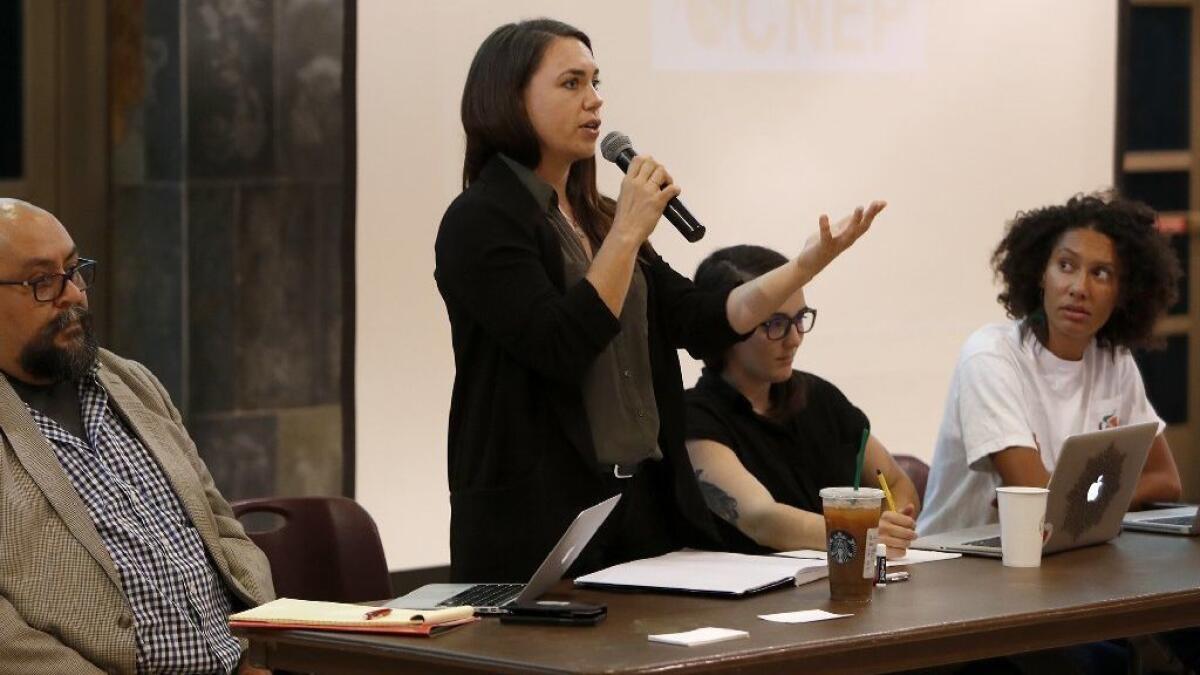Disputed needle-exchange program hears frustration from crowd at town hall meeting

- Share via
As representatives of the Orange County Needle Exchange Program wrapped up a town hall meeting Thursday evening, one thing became clear: They wished they had held the gathering earlier.
“If we could go back in time and hold these town halls in February, we would,” Dallas Augustine, a member of the program’s board of directors, told the crowd at the Downtown Anaheim Community Center. “We can’t undo that, so that’s why we’re here now, and we’re very sorry that we didn’t come earlier.”
That sentiment came as little comfort to some of the more than 120 people who attended the meeting. The four panelists were at times interrupted by jeers and cries of disbelief or indignation from the crowd.
The town hall was the first since the California Department of Public Health last month approved the program’s proposal for a mobile needle-exchange service to distribute clean needles and other supplies to try to prevent the spread of diseases among intravenous drug users. The program would operate for two years in specified areas of Costa Mesa, Anaheim, Orange and Santa Ana.
Though details are being finalized, Augustine said the program plans to hold similar community meetings in the three other affected cities.
According to representatives of the nonprofit organization, the goal of this week’s event was to provide additional information about the needle exchange and respond to questions and concerns from the public.

The meeting took place amid continuing backlash to the state’s approval of the program. Orange County, the county Flood Control District and the cities of Costa Mesa, Anaheim and Orange are taking legal action aimed at stopping the program and filed a court motion Tuesday seeking a preliminary injunction.
Also this month, the Costa Mesa City Council adopted an urgency ordinance prohibiting needle exchanges anywhere in the city. Newport Beach announced plans to file its own lawsuit against the state.
Program board member Kelley Butler said at Thursday’s meeting that the needle exchange “is not the only piece of the puzzle” in solving the nation’s drug epidemic but serves an important function by helping prevent the spread of diseases such as HIV and Hepatitis C.
“Instead of going to an intravenous drug user — who is using some of the most addictive substances known to man, known to the medical community — and telling them ‘Stop using,’ we’d rather you just not suffer from a behavior that you’re engaging in,” she said.
However, members of the panel were sometimes drowned out by outbursts of “Give them treatment, not paraphernalia!” and “You’re just making it easier for them to do it!”
Panelists also said the program is a way for drug users to connect with resources that, hopefully, will set them on a path to recovery.
“Everybody that goes through our line then gets referrals to treatment, housing, whatever else they might need,” Augustine said. “So not only do they get that, but they have a supportive community who is not judgmental, who is rooting for them.”
A common criticism since the state’s approval has been about the locations selected for the program. In Costa Mesa, the service would operate on West 17th Street between Whittier Avenue and the city boundary — an area opponents say is inappropriate because of its proximity to homes, businesses and schools.
Carol Newark, another program board member, said the sites weren’t chosen thoughtlessly.
“It wasn’t like we just looked at a map and said, ‘Oh, here it is,’” she said. “We spent a lot of time selecting these locations and they’re based on our site visits, they’re based on zoning maps and they’re also based on data … of rates of HIV and overdoses.”

Critics also have raised concerns about public health and safety, saying they fear the program will attract drug users to their communities and lead to needles being thrown away in neighborhoods and other places where children and families gather.
Needle litter emerged as an issue when the exchange operated out of the Santa Ana Civic Center. Officials in that city cited an increase in the number of discarded syringes as a reason for scrapping the program in January.
As part of the state’s approval, the needle exchange has agreed to work with the Orange County Health Care Agency to increase options for sharps disposal, provide additional collection services and operate a hotline for reports of improperly discarded syringes and other concerns.
“Even if you shut down the needle exchange, people will still go and buy needles at CVS, at Walgreens, at Rite-Aid, and they will have nowhere to dispose of them,” Newark said. “All of the needles that have been found in the community in the last nine months were not given out by us.”
For more information about the needle-exchange program, visit ocnep.org.
Twitter @LukeMMoney
All the latest on Orange County from Orange County.
Get our free TimesOC newsletter.
You may occasionally receive promotional content from the Daily Pilot.




